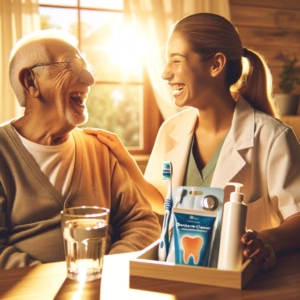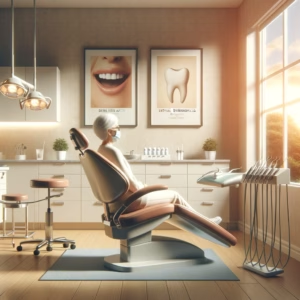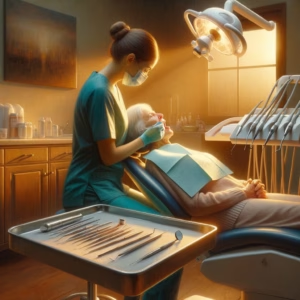Understanding Senior Oral Health
Oral health is a vital component of overall well-being, particularly for seniors. As individuals age, they face unique challenges that can significantly impact their oral hygiene and health. Understanding these challenges is crucial for promoting effective oral care and maintaining a high quality of life.
One of the primary challenges seniors face is the natural aging process, which can lead to a variety of dental issues. Common conditions include dry mouth (xerostomia), gum disease, and tooth loss. Medications taken for chronic illnesses can exacerbate these conditions by reducing saliva production, which is essential for oral health. Furthermore, age-related changes in the mouth can affect the fit of dentures, leading to discomfort, difficulty in chewing, and even social withdrawal due to embarrassment.
Poor oral health in seniors can have far-reaching effects on their overall health. Studies have shown a strong correlation between oral health and systemic conditions such as cardiovascular disease, diabetes, and respiratory illnesses. Inadequate oral hygiene may lead to an increase in harmful bacteria, which can enter the bloodstream and contribute to these serious health issues. Additionally, oral pain and discomfort can hinder a senior’s ability to eat nutritious foods, potentially resulting in weight loss, malnutrition, and a decline in general health.
Moreover, oral health has a significant impact on mental well-being. Poor dental health can lead to feelings of embarrassment, reduced self-esteem, and social isolation. Seniors may become reluctant to engage in social interactions or participate in activities that require speaking or eating, thereby affecting their emotional and psychological health.
To mitigate these challenges, it is essential for seniors to prioritize their oral health through regular dental check-ups, proper oral hygiene practices, and a balanced diet. Caregivers and family members play a critical role in supporting seniors by encouraging routine dental visits, assisting with daily oral care, and providing education on the importance of maintaining good oral hygiene.
In summary, oral health is a cornerstone of overall well-being for seniors. Understanding the unique challenges they face and the potential consequences of poor oral hygiene can help foster a proactive approach to dental care, ultimately enhancing their quality of life and promoting healthier aging.
Common Oral Health Emergencies
Seniors are particularly vulnerable to various oral health emergencies due to the natural aging process, reduced saliva production, and the cumulative effects of chronic diseases. It is essential to recognize these emergencies to ensure timely intervention and treatment. Below are some of the most frequent oral health emergencies experienced by seniors:
Tooth Decay (Cavities)
Tooth decay is a prevalent issue among seniors, often exacerbated by dry mouth, which can result from medications or age-related changes. When saliva production decreases, the mouth becomes less capable of neutralizing acids produced by bacteria, leading to an increased risk of cavities. If left untreated, tooth decay can progress to infection and may require more extensive dental procedures such as root canals or extractions. Regular dental visits and effective oral hygiene practices are crucial in preventing tooth decay.
Gum Disease (Periodontal Disease)
Gum disease is another significant concern for seniors, characterized by inflammation and infection of the gums. It can range from mild gingivitis to more severe periodontitis, which can lead to tooth loss if not addressed. Seniors are at a heightened risk due to factors such as chronic diseases (e.g., diabetes), smoking, and poor oral hygiene. Common symptoms include swollen gums, persistent bad breath, and bleeding during brushing. Early detection and treatment by a dental professional are vital to managing gum disease and preserving oral health.
Broken Dentures
For many seniors, dentures are a necessary aid for eating and speaking. However, as the jawbone changes over time, dentures may become loose or break, leading to discomfort, difficulty in chewing, and potential injuries to the gums. Broken dentures can also impact self-esteem and social interactions. It is important for seniors to have regular dental check-ups to ensure their dentures fit properly and to address any repairs or adjustments needed promptly.
Oral Infections
Infections in the mouth, such as abscesses or oral candidiasis (thrush), can occur more frequently in seniors due to weakened immune systems or underlying health conditions. Signs of an oral infection may include swelling, pain, difficulty swallowing, and a visible pus-filled area. These infections require immediate dental attention to prevent further complications and manage pain.
Oral Trauma
Seniors are at a higher risk of oral trauma due to falls or accidents, particularly if they have mobility issues. This trauma can result in chipped teeth, loose teeth, or injuries to the soft tissues of the mouth. Prompt evaluation by a dental professional is critical in such cases to determine the extent of the damage and implement necessary treatments.
Dry Mouth (Xerostomia)
While not an emergency in the traditional sense, dry mouth can lead to significant oral health issues if untreated. It can result in discomfort, difficulty chewing and swallowing, and an increased risk of tooth decay and gum disease. Seniors should communicate with their healthcare providers about any medications causing dry mouth and explore possible remedies, such as saliva substitutes or changes in medication.
Addressing these common oral health emergencies proactively will help seniors maintain their oral health and overall well-being. Regular dental visits, good oral hygiene practices, and awareness of changes in oral health are essential components of effective care for older adults.
Identifying Symptoms of Dental Emergencies
Recognizing the signs of a dental emergency is crucial for seniors and their caregivers, as timely intervention can prevent further complications and alleviate discomfort. Here are some key symptoms that may indicate a dental emergency:
- Severe Pain: Intense or persistent pain in the mouth, jaw, or teeth is often a clear indicator of a dental emergency. This pain may be sharp, throbbing, or constant and can be caused by various issues, such as tooth decay, an abscess, or gum disease. If the pain is severe enough to interfere with daily activities or disrupt sleep, it is important to seek dental care promptly.
- Swelling: Noticeable swelling in the gums, face, or jaw can signal an underlying problem, such as an infection or an impacted tooth. Swelling may accompany pain and can indicate that the body is fighting an infection. If there is significant swelling or if it is accompanied by fever or difficulty breathing, immediate medical attention is necessary.
- Difficulty Eating or Swallowing: Challenges in chewing or swallowing can arise from dental issues, such as loose teeth, sore gums, or jaw pain. Difficulty eating not only affects a senior’s nutrition but can also lead to further complications, such as weight loss and malnutrition. If a senior is unable to eat comfortably, it’s essential to consult a dentist.
- Loose or Missing Teeth: A tooth that has suddenly become loose or has fallen out should be treated as an emergency, especially if it occurs due to trauma or decay. Quick action can sometimes save the tooth, and immediate dental care is advised.
- Bleeding Gums: Bleeding while brushing or flossing can indicate gum disease. However, if the bleeding is excessive or occurs spontaneously, it could be a sign of a more serious condition that requires dental evaluation.
- Abscess or Pus: The presence of pus, which may appear as a yellow or white discharge from the gums or around a tooth, is a sign of infection and necessitates immediate dental care.
In conclusion, recognizing these symptoms can help seniors and their caregivers respond promptly to dental emergencies. Early intervention not only alleviates pain and discomfort but also helps to maintain overall health and well-being. Regular dental check-ups and open communication about any oral health changes are essential in preventing emergencies and ensuring a healthier, more comfortable life.
Immediate First Aid Measures for Oral Health Emergencies
When an oral health emergency occurs, quick and appropriate first aid measures can make a significant difference in alleviating discomfort and preventing further complications. Here are some essential steps seniors or caregivers can take:
- Control Bleeding: If there is bleeding from the mouth, have the individual sit up and apply gentle pressure with a clean cloth or gauze to the affected area. Encourage them to avoid swallowing blood and to remain calm. If bleeding persists after 10 minutes of sustained pressure, seek professional help.
- Manage Pain: For pain relief, consider over-the-counter pain medication such as acetaminophen or ibuprofen. Always follow the recommended dosage instructions. If the person is on other medications or has health concerns, consult a healthcare provider before administering pain relievers.
- Rinse the Mouth: If there are cuts or sores in the mouth, rinsing with warm saltwater can help reduce irritation and cleanse the area. Mix about one teaspoon of salt in a glass of warm water and have the individual swish gently, then spit it out. Avoid using mouthwash with alcohol, as it can irritate the tissues.
- Address Swelling: For swelling due to trauma or infection, applying a cold compress to the outside of the cheek can help reduce inflammation. Use an ice pack wrapped in a cloth for 15-20 minutes at a time.
- Handle Lost or Broken Teeth: If a tooth has been knocked out, handle it by the crown (the visible part) and avoid touching the root. Rinse the tooth gently with water and attempt to place it back in the socket if possible. If this is not feasible, store the tooth in a container of milk or saline solution and seek dental care immediately.
- For Denture Emergencies: If dentures break or cause pain, remove them to prevent further irritation. Do not attempt to repair dentures at home; instead, contact a dental professional for assistance.
- Recognize Signs of Infection: Be aware of symptoms such as persistent pain, swelling, fever, or bad breath, which may indicate an infection. In such cases, it is crucial to seek professional dental care as soon as possible.
- Document the Incident: Keep a record of what happened, including symptoms and any first aid measures taken. This information will be helpful for the dental professional when assessing the situation.
By following these immediate first aid measures, seniors and their caregivers can provide essential support during oral health emergencies until professional help is available.
Locating Dental Emergency Services in Ashburn, VA
In the event of a dental emergency, timely intervention is crucial to alleviate pain and prevent further complications. Fortunately, Ashburn, VA, offers several options for immediate dental care. Below is a list of dental clinics and emergency dental services in the area, complete with contact details and services provided.
- Dental Emergency Room
- Address: 43777 Central Station Dr Ste 175, Ashburn, VA 20147
- Phone: (703) 723-0938
- Services: Open 24/7, this clinic specializes in urgent dental care, including treatment for toothaches, broken teeth, and other emergencies.
- Ashburn Dental Care
- Address: 22185 S. Winding Way Ln, Suite 101, Ashburn, VA 20148
- Phone: (703) 724-5868
- Services: Offers emergency appointments for various dental issues. They have flexible hours and are committed to providing relief for dental pain.
- Smile Wide
- Address: 21595 Ridgetop Cir #100, Sterling, VA 20166 (just a short drive from Ashburn)
- Phone: (703) 444-1100
- Services: Provides emergency dental care with same-day appointments available. They treat a range of conditions from severe pain to dental trauma.
- Loudoun Valley Dental
- Address: 20945 Professional Plaza #105, Ashburn, VA 20147
- Phone: (703) 729-2200
- Services: While primarily a general dentistry office, they offer emergency care during regular business hours and will accommodate urgent needs as possible.
- Advanced Dental Care
- Address: 44810 Lakeview Overlook Suite 105, Ashburn, VA 20147
- Phone: (703) 724-0700
- Services: Provides emergency dentistry with a focus on quick pain relief and treatment for dental injuries.
- Dulles Dental
- Address: 21300 Windmill Parc Dr #106, Ashburn, VA 20147
- Phone: (703) 444-0400
- Services: Offers emergency dental services and strives to see patients as quickly as possible. They handle a variety of emergencies, including extractions and repairs.
In case of severe or life-threatening situations, visiting a local emergency room may be necessary. However, for acute dental issues, the aforementioned clinics are equipped to handle your emergency dental needs effectively. It’s advisable to call ahead when possible to confirm availability and expedite your visit.
Prevention Strategies for Seniors
To prevent oral health emergencies, seniors can adopt specific strategies that emphasize the importance of regular dental check-ups and good oral hygiene habits. These proactive measures can not only reduce the risk of dental issues but also enhance overall health and well-being.
Regular Dental Check-ups
One of the most effective prevention strategies is to establish a routine of regular dental check-ups. Seniors should visit their dentist at least twice a year for comprehensive examinations and professional cleanings. These visits allow dental professionals to identify potential problems early on, such as cavities, gum disease, or oral cancers, which can be more easily treated when caught early. Additionally, dentists can provide personalized advice tailored to individual health needs and medication effects, ensuring seniors have a plan that supports their oral health.
Good Oral Hygiene Practices
Seniors should maintain diligent oral hygiene practices to minimize the risk of dental emergencies. This includes brushing teeth at least twice a day with a fluoride toothpaste and flossing daily. If physical limitations make traditional brushing difficult, electric toothbrushes or floss holders can be effective alternatives. It’s also important to clean dentures or dental appliances daily, as neglecting these can lead to infections or discomfort.
Stay Hydrated
Since dry mouth is a common issue among seniors, staying hydrated is essential. Drinking plenty of water throughout the day helps to stimulate saliva production, which is vital for neutralizing acids produced by bacteria in the mouth. Saliva also aids in remineralizing teeth and washing away food particles. Seniors should consider discussing saliva substitutes or medications to alleviate dry mouth with their healthcare provider if necessary.
Healthy Eating Habits
A balanced diet plays a significant role in maintaining good oral health. Seniors should focus on consuming nutrient-rich foods that support oral and overall health, such as fruits, vegetables, whole grains, lean proteins, and dairy products. Avoiding sugary snacks and beverages can significantly reduce the risk of cavities and gum disease. It is also advisable to limit acidic foods, as they can erode tooth enamel.
Use of Fluoride
Fluoride is a powerful ally in preventing tooth decay. Seniors should consider using fluoride mouth rinses or gels if recommended by their dentist, especially if they are at higher risk for cavities. In some cases, dental professionals may suggest fluoride treatments during check-ups to strengthen tooth enamel.
Educate and Communicate
Open communication between seniors and their dental care providers is crucial. Seniors should feel comfortable discussing any changes in their oral health, concerns about medications, or difficulties they encounter in maintaining oral hygiene. Caregivers can assist by promoting awareness about oral health and ensuring that seniors have access to the necessary resources, including educational materials and dental appointments.
In conclusion, seniors can significantly reduce the likelihood of oral health emergencies by prioritizing preventive measures. Regular dental check-ups, consistent oral hygiene habits, proper hydration, a balanced diet, and the use of fluoride can help maintain optimal oral health. By taking these proactive steps, seniors will not only protect their teeth and gums but also enhance their overall quality of life, leading to healthier aging.






